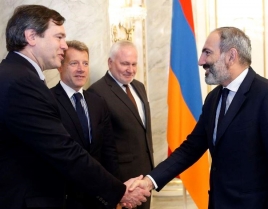Mediators Meet New Armenian Leaders On Karabakh

Seeking to restart the Nagorno-Karabakh peace process, U.S., Russian and French mediators have held their first talks with Armenia’s new leadership in Yerevan.
The three diplomats co-chairing the OSCE Minsk Group met with Prime Minister Nikol Pashinian on Wednesday more than one month after he swept to power in a wave of mass protests that brought down the country’s previous government.
A statement by Pashinian’s office said they discussed steps “to form a favorable atmosphere for advancing the negotiation process.” It said they stressed the importance of implementing confidence-building agreements that were reached by Azerbaijan’s President Ilham Aliyev and his former Armenian counterpart Serzh Sarkisian at their last three meetings held in 2016 and 2017.
The agreements called for specific measures to bolster the shaky ceasefire regime along the Karabakh “line of contact” and on the Armenian-Azerbaijani border. Those include the deployment of more truce monitors by the Organization for Security and Cooperation in Europe. Baku has been reluctant to implement these safeguards against deadly fighting, saying that they could cement the status quo.
The statement cited Pashinian as expressing confidence about his “productive cooperation” with the mediating troika. It gave no other details of his meeting with Andrew Schofer of the United States, Russia’s Igor Popov and France’s Stephane Visconti. Andrzej Kasprzyk, the longtime head of a small OSCE mission monitoring the ceasefire regime in the Karabakh conflict zone, was also present at the talks.
The mediators met with Armenia’s recently appointed Foreign Minister Zohrab Mnatsakanian on Tuesday. The Armenian Foreign Ministry said they held a detailed discussion on how to end the conflict but did not elaborate.
The Minsk Group co-chairs met with Azerbaijan’s Foreign Minister Elmar Mammadyarov in Paris on May 15. In a joint statement they said Mammadyarov “expressed Azerbaijan's readiness to resume active negotiations as soon as possible.”
Pashinian has repeatedly called for Karabakh representatives’ direct involvement in Armenian-Azerbaijani peace talks. Speaking in the Armenian parliament last week, the premier again claimed that he has no mandate to “negotiate on behalf of the Karabakh people.” But he said at the same time that he is ready to meet with Aliyev.
Mammadyarov and other Azerbaijani officials have made clear that Baku will not directly negotiate with the “separatist regime” in Karabakh. They maintain that Karabakh is an Azerbaijani territory occupied by Armenia.
Senior Armenian diplomats have indicated that Pashinian’s public statements are not a precondition for resuming peace talks. Deputy Foreign Minister Ruben Rubinian insisted on Monday that there are “no big differences” between the new and former Armenian governments’ positions on a Karabakh settlement.
Pashinian has yet to publicly clarify his view on a framework peace accord that has been advanced by U.S., Russian and French mediators for more than a decade. It calls for a phased settlement that would start with the liberation of virtually all seven districts around Karabakh which were fully or partly occupied by Karabakh Armenian forces during the 1991-1994 war. In return, Karabakh’s predominantly ethnic Armenian population would determine the territory’s internationally recognized status in a future referendum.
Serzh Sarkisian’s government said all along that this compromise peace formula is largely acceptable to Yerevan.
Sarkisian and Aliyev pledged to revive the stalled peace process at their last face-to-face meeting held in Geneva in October 2017. Their foreign ministers held what they described as “positive” follow-up talks in December and January.
https://www.azatutyun.am/a/29288445.html




